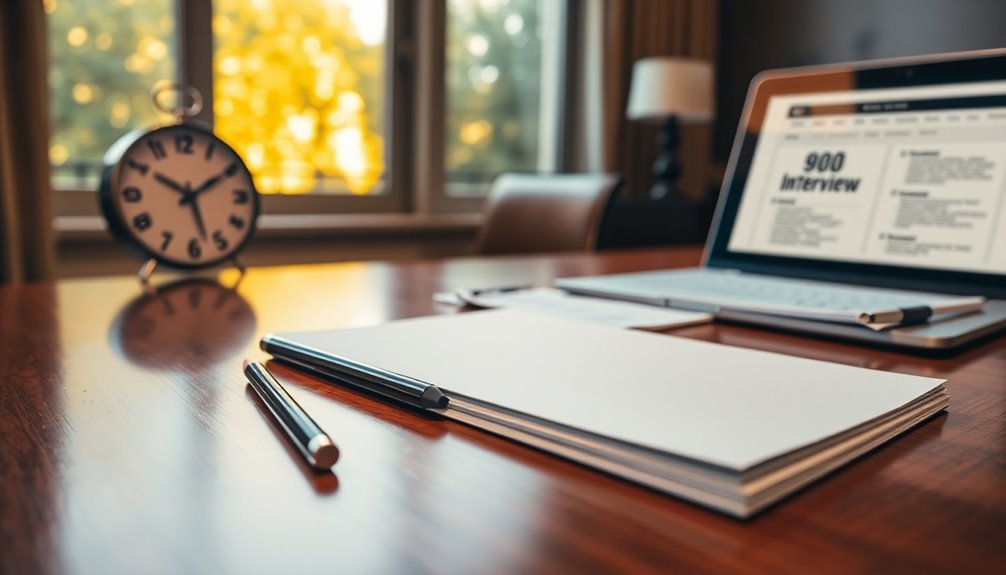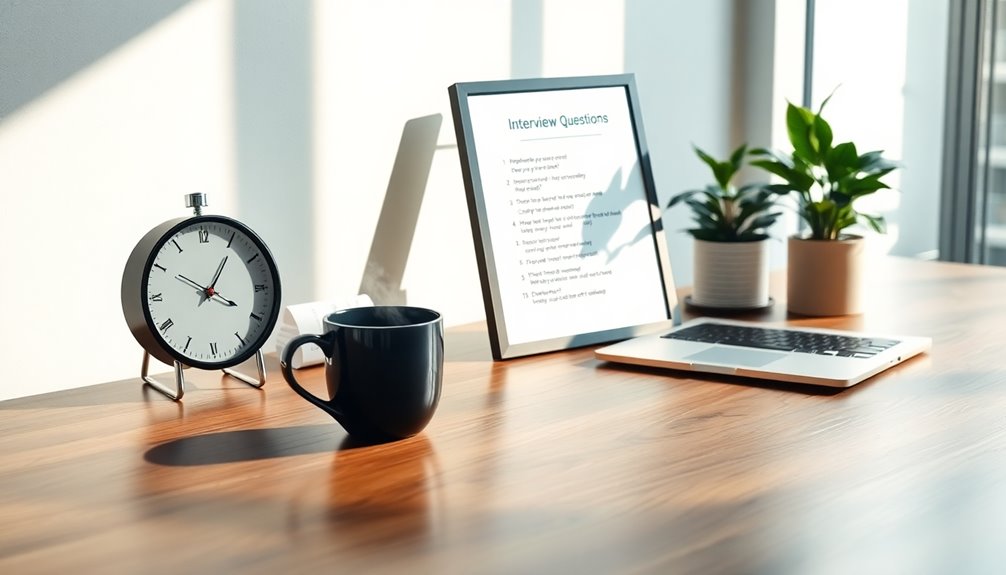Mastering situational interview questions is essential for demonstrating your problem-solving skills and fit with a company's culture. Use the STAR method to structure your responses: outline the Situation, specify the Task, detail the Action you took, and highlight the Result. Be ready to address mistakes transparently, showing accountability and a plan for resolution. Adaptability is key—show how you tackle new challenges with a proactive mindset. Also, highlight effective conflict resolution techniques, emphasizing open dialogue and active listening. There's plenty more to explore that can refine your skills even further.
Key Takeaways
- Utilize the STAR method to clearly structure responses, making it easier for interviewers to follow your thought process.
- Prepare for various situational questions by reflecting on past experiences that showcase problem-solving and adaptability.
- Focus on demonstrating accountability when discussing mistakes, emphasizing learning and resolution strategies employed.
- Practice active listening during interviews to ensure you understand the questions and respond thoughtfully to each scenario presented.
- Highlight your communication skills by articulating your actions and the positive outcomes they achieved in challenging situations.
Understanding Situational Interview Questions

In today's competitive job market, understanding situational interview questions is essential for any candidate. These questions assess how you handle specific job-related scenarios, giving employers insight into your problem-solving skills, ethical standards, and communication abilities.
When faced with a situational question, you'll reveal your approach to real-world challenges, showcasing your adaptability and integrity. Employers use these questions to predict your future job performance and see if you align with their company culture.
The STAR Method Explained

Mastering the STAR method can greatly enhance your responses to situational interview questions. This structured approach helps you articulate your experiences clearly.
Start with the Situation, where you set the context. Next, explain the Task that needed to be accomplished. Then, detail the Action you took to address the Situation. Finally, share the Result of your actions, focusing on the positive outcome.
This method not only guarantees you answer thoroughly but also allows you to highlight your problem-solving skills and adaptability. By practicing the STAR technique, you'll feel more confident and prepared to tackle any situational question, making a lasting impression on your interviewers.
Implement this strategy, and watch your interview performance improve considerably.
Addressing Mistakes and Quality

Mistakes occasionally happen in any workplace, and how you address them can greatly impact your reputation and effectiveness.
When you spot an error, take immediate accountability. For instance, if you realize you've made a mistake in a project, don't hesitate to correct it. Transparency is key; communicate with your superiors about the issue and outline your plan to resolve it. This honesty not only maintains quality but also shows your commitment to customer satisfaction.
Additionally, learn from these experiences. Reflect on what went wrong and identify steps to prevent similar issues in the future. By demonstrating your ability to handle mistakes constructively, you'll build trust and reinforce your reputation as a responsible team member.
Adapting to New Challenges

Facing new challenges is an inevitable part of any job, and your ability to adapt can set you apart from other candidates. When confronted with unfamiliar tasks or systems, show your willingness to learn and seek help.
For instance, if you're asked to manage a new software program, don't hesitate to reach out to colleagues or utilize available training resources. Demonstrating a proactive approach illustrates your commitment to growth and teamwork. Additionally, leveraging knowledge about energy-efficient heat pumps can enhance your problem-solving skills in various scenarios. Understanding the Coefficient of Performance (COP) can also help you assess the efficiency of new systems you may encounter. Furthermore, recognizing how heat pumps outperform traditional systems can provide you with insights into operational efficiencies that may be beneficial in unfamiliar situations.
In your interview, share specific examples where you successfully navigated unexpected changes—this showcases your flexibility. Remember, adaptability isn't just about handling change; it's about thriving in it. Communicating your adaptability effectively can make a significant impression on potential employers and enhance your chances of success.
Learning From Failures

While it's easy to feel discouraged after a setback, viewing failures as opportunities for growth can transform your approach to challenges.
When you encounter a failure, take a moment to analyze what went wrong. Ask yourself what you could've done differently and how you can apply those lessons moving forward.
For instance, if you missed a deadline, consider implementing better time management strategies or prioritization techniques.
Embrace the discomfort of failure; it's often where the most profound learning occurs. Remember, resilience is key. Each setback helps build your ability to adapt and persevere. Additionally, adopting a mindset of self-acceptance can significantly enhance your ability to navigate challenges and emerge stronger.
Conflict Resolution Techniques

When conflicts arise, addressing them head-on can lead to constructive outcomes and stronger relationships. Start by acknowledging the issue and encouraging open dialogue.
Listen actively to all parties involved; this shows you value their perspectives. Use "I" statements to express your feelings without placing blame, fostering a more collaborative environment.
Focus on finding common ground or shared goals, which can help shift the conversation from confrontation to cooperation.
Brainstorm potential solutions together, ensuring everyone feels heard and included.
Finally, agree on an action plan to prevent similar conflicts in the future. Additionally, incorporating trust-building activities can significantly enhance the relationship dynamics as you work through conflicts together.
Effective Communication Strategies

Resolving conflicts effectively often hinges on strong communication skills. You need to express your thoughts clearly while also being receptive to others.
Here are three effective communication strategies to implement:
- Active Listening: Focus on what the other person is saying without interrupting. This shows respect and helps you understand their perspective fully.
- Empathy: Acknowledge the emotions involved. Validating feelings can diffuse tension and pave the way for a constructive dialogue.
- Clear Expression: Use concise language to articulate your points. Avoid jargon and be direct to prevent misunderstandings.
Promoting Innovation and Collaboration

Innovation thrives in environments where collaboration is encouraged. When you work together with diverse teams, you're more likely to generate creative ideas and solutions.
To promote this, foster open communication and create spaces for brainstorming sessions. Encourage everyone to share their perspectives, as this variety can lead to breakthroughs that one person alone might miss.
Recognize and celebrate team successes to reinforce the value of collaboration. When faced with situational interview questions about innovation, highlight your experiences where teamwork led to significant results.
Show that you're not just a solo performer but someone who thrives in a collective atmosphere. Remember, the best ideas often emerge when individuals unite their strengths to tackle challenges creatively.
Frequently Asked Questions
How Can I Prepare for Unexpected Situational Interview Questions?
To prepare for unexpected situational interview questions, practice thinking on your feet. Reflect on past experiences and identify key challenges you faced.
Use the STAR method to structure your responses: describe the situation, task, action, and result. Keep your answers concise and relevant.
Additionally, stay calm and take a moment to gather your thoughts before answering. This approach helps you demonstrate your problem-solving skills and adaptability in real-time.
What Are Common Mistakes Candidates Make During Situational Interviews?
Steering through a situational interview can feel like walking a tightrope.
Common mistakes candidates make include failing to provide specific examples, giving vague answers, or not using the STAR method properly.
You might also overlook the importance of aligning your responses with the company's values or underestimate the power of storytelling.
How Do I Showcase My Adaptability in Responses?
To showcase your adaptability in responses, focus on specific examples where you successfully adjusted to new challenges.
Describe a situation where you quickly learned a new skill or changed your approach to meet evolving demands.
Highlight your willingness to seek help or resources and share the positive outcomes of those experiences.
Use the STAR method to structure your answer, ensuring clarity and emphasizing how your adaptability aligns with the role you're applying for.
What Role Does Body Language Play in Situational Interviews?
When you step into a situational interview, your body language speaks volumes, much like a well-composed symphony. It conveys confidence, openness, and engagement.
Maintain eye contact to show you're attentive, and use gestures to emphasize points. Lean slightly forward to express interest. Avoid crossing your arms, as it can signal defensiveness.
How Can I Follow up After a Situational Interview?
After a situational interview, you should follow up with a thank-you email within 24 hours.
Express appreciation for the opportunity and briefly mention a key point from your discussion that reinforces your fit for the role.
Keep it concise and professional.
If you haven't heard back within a week or two, feel free to send a polite inquiry about your application status.
This shows your continued interest and enthusiasm for the position.
Conclusion
You've got the tools to shine in your next job interview. Just like a skilled sailor navigates through stormy seas, you can steer through situational questions with confidence and clarity. By mastering the STAR method and embracing challenges, you'll not only highlight your strengths but also show your commitment to growth. Remember, every question is an opportunity to showcase your unique skills and fit for the role. Set sail toward success—your dream job awaits!









